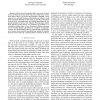Free Online Productivity Tools
i2Speak
i2Symbol
i2OCR
iTex2Img
iWeb2Print
iWeb2Shot
i2Type
iPdf2Split
iPdf2Merge
i2Bopomofo
i2Arabic
i2Style
i2Image
i2PDF
iLatex2Rtf
Sci2ools
INFOCOM
2007
IEEE
2007
IEEE
A Framework for Tiered Service in MPLS Networks
— Many network operators offer some type of tiered service, in which users may select only from a small set of service levels (tiers). Such a service has the potential to simplify a wide range of core network functions, allowing the providers to scale their operations efficiently. In this work, we provide a theoretical framework for reasoning about and tackling algorithmically the general problem of service tier selection. Drawing upon results from discrete location theory, we formulate the problem as a p-median problem under a new directional distance measure, and we develop efficient algorithms for a number of important variants. Our main finding is that, by appropriately selecting the set of service levels, network providers may realize the benefits of tiered service with only a small sacrifice in network resources.
Related Content
| Added | 03 Jun 2010 |
| Updated | 03 Jun 2010 |
| Type | Conference |
| Year | 2007 |
| Where | INFOCOM |
| Authors | George N. Rouskas, Nikhil Baradwaj |
Comments (0)

